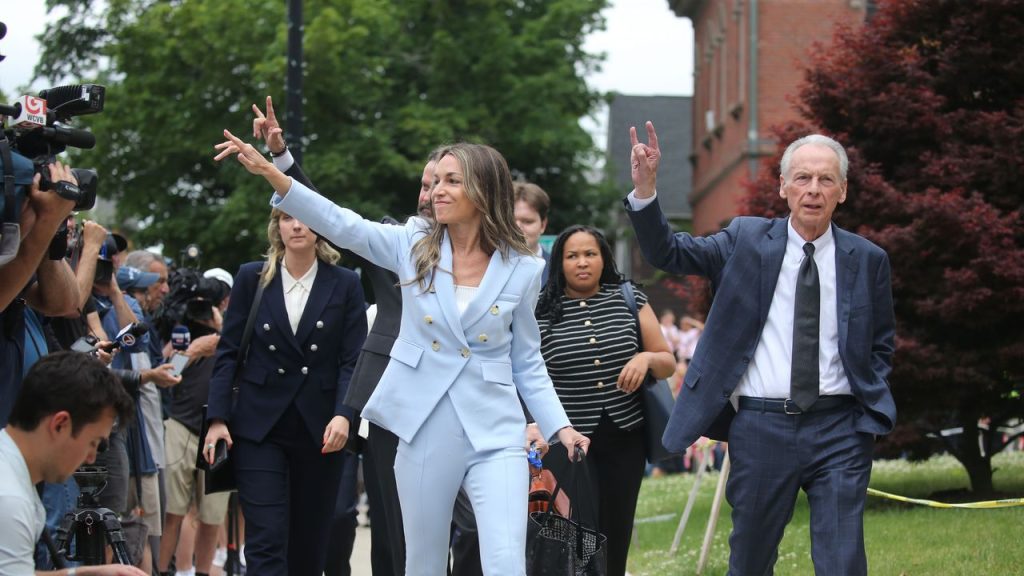Last month, Karen Read was acquitted of second-degree murder and vehicular manslaughter, ending a Massachusetts legal saga containing enough John Grisham–style plot twists to captivate international interest. The verdict ended Norfolk County district attorney Michael Morrissey’s three-and-a-half-year, two-trial pursuit of convicting Read, who was charged with fatally hitting her Boston police officer boyfriend, John O’Keefe, in 2022.
After the first trial ended with a hung jury last summer, Morrissey hired a special prosecutor to lead the charge against Read a second time. The county paid Whitey Bulger’s former defense lawyer Hank Brennan $566,000 to try the case—because top prosecutors in the DA’s office wouldn’t touch it, sources told VF last year. Djuna Perkins, a former assistant district attorney in Suffolk County hoping to unseat Morrissey in the 2026 election, estimates that Morrissey spent about $1 million on the second trial—more than a third of his office’s entire operating budget. (Asked about this claim, Morrissey’s office told VF it did not yet know the total cost of the trial.) In the end, the jury only found Read guilty of operating under the influence of liquor. For that misdemeanor, Read was sentenced to one year probation.
After the acquittal, one of Read’s lawyers, Alan Jackson, told VF, “This is not how DAs are supposed to conduct themselves. Morrissey had an ethical obligation to review the first trial in detail and make a reasonable determination: whether he believed the case could be put in front of 12 independent thinkers, a jury, and the charges be proven beyond a reasonable doubt.” (In response to the claim that Read’s second trial was a matter of ego, a representative for Morrissey said, “It is not uncommon for district attorneys in Massachusetts to retry cases that initially end in a mistrial.”)
Some jurors, and the public, were irked by three elements of the trial: its extreme cost, the staggeringly inept investigation into O’Keefe’s death by the state police officers working in Morrissey’s office and by local law enforcement, and the agony the second high-profile court proceeding inflicted on O’Keefe’s family. “I’m a mother and I saw her pain through all those days,” juror Paula Prado told CBS News after the verdict.
Rachael Rollins, the former US attorney for Massachusetts, told VF, “Obviously this outcome is a tragedy for the O’Keefe family. As a prosecutor, you always seek to secure a verdict for the victim and their loved ones…but we are left with the undisputed fact that multiple juries rejected the prosecution’s case.” Read’s allegations of law enforcement corruption and incompetence outraged a snowballing legion of supporters, in the state and beyond. Many watched live as Read’s legal team—which included Jackson, David Yannetti, Elizabeth Little, Robert Alessi, and Victoria George—subjected prosecution witnesses, many of whom were law enforcement, to withering cross-examinations about their handling of Read’s investigation. Says Rollins, “The now documented misconduct or questionable actions by members of law enforcement—both within and outside the Norfolk County DA’s office—has had real consequences.”
Suspicious death investigations in Norfolk County are handled by Massachusetts State Police troopers working out of Morrissey’s office. Since the first Read trial, some of those troopers have been fired or relocated following internal investigations directly relating to their conduct on the case. Michael Proctor, the lead detective who Read says masterminded her framing, was dishonorably discharged in March. (He denies the allegation and his appeal is pending, according to his attorney.) Proctor testified about wrapping up his investigation within hours of it starting without even stepping foot on the crime scene. He also read aloud texts he’d sent to coworkers saying he was searching Read’s phone for nudes, in a string of messages in which he also deemed Read, the suspect of his investigation, “a whackjob cunt.” Among Proctor’s supervisors was Brian Tully, who headed the unit investigating Read, and who failed to discipline Proctor. Tully was later transferred out of the DA’s unit, and in November 2024, an internal investigation found he had violated rules and regulations. Yuri Bukhenik, a Proctor supervisor on the case who gave a thumbs-up to that text chain, was moved out of Morrissey’s office and reassigned to an administrative role. During the first trial, he testified about critical video evidence that, he acknowledged under cross-examination, had been inverted. Another investigator on the case, David DiCicco, was also recently moved out of Morrissey’s office.

